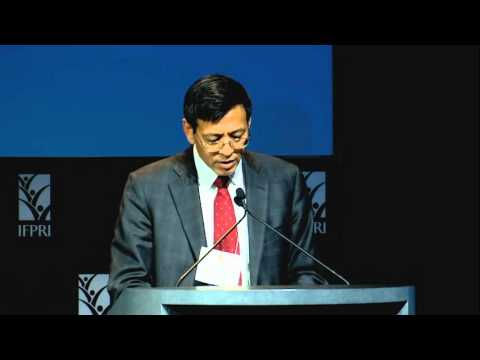The following blog story was originally published on the Compact2025 website.
On November 18, 2015, IFPRI officially launched Compact2025, a bold new initiative to end hunger and undernutrition by 2025.
Compact2025 works with countries to bring stakeholders together, set priorities, innovate and learn, build on successes, and synthesize sharable lessons to accelerate progress in ending hunger and undernutrition.
The event opened with an inspiring introductory video and welcome remarks from IFPRI Director General Shenggen Fan, who set the tone for the program by discussing the ambition of ending hunger and undernutrition by 2025.
“Can it be done?” Fan put forth. “The evidence is promising. Some countries have made very rapid advances against hunger and undernutrition, using several different approaches. We know, then, that it is possible to accelerate progress, if you combine political will with the right policies and investments. This evidence says that we can end hunger and undernutrition by 2025.
“And indeed, we will do it,” Fan added. “Compact2025 is designed to get us there.”
Kanayo Nwanze, President of the International Fund for Agricultural Development emphasized the need to support smallholders, women, and youth in agriculture to end hunger and undernutrition. “We need to focus on smallholders because they are the engine of sustainable and inclusive rural transformation,” he said via a video message.
Ertharin Cousin, Executive Director of the United Nations World Food Programme, also conveyed her support by way of a video message. “To achieve the global sustainability agenda of 2030, we know we must achieve the goal of 2025 of ending hunger,” Cousin said. “The poet Maya Angelou once said, ‘Do the best you can until you know better. And when you know better, do better.’ It is only when we know better and can do better for the people we serve [that we can] ensure our ability to achieve zero hunger.”
Chinese Olympic Gold Medalist in diving Gao Min, Compact2025’s first ambassador, offered words of advice and inspiration from her own experience. “Many factors helped my success in diving,” she said. “But two factors are most critical. First, I had clear goal. Then, I did the work to make it happen. Compact2025 is a big idea that can help millions of people. But success will have the same two parts. Set the goal. Make it happen.”
Among the other champions sharing their commitment to accelerating the end of hunger and undernutrition were USAID Director of Policy Jeff Hill, Rwanda Minister of Agriculture and Animal Resources Gerardine Mukeshimana, and UPL Limited CEO Jai Shroff.
A sense of urgency—and excitement about what is possible—was palpable. The first countries to join the initiative—Bangladesh, Ethiopia, Malawi, and Rwanda—are already preparing to mobilize their diverse stakeholders, work across sectors, and identify successful programs and policies for scaling up. “We stand ready if we get the right input to implement…to conquer hunger and undernutrition,” said Malawi Vice President Saulos Chilima.
Compact2025 will help accelerate progress to end hunger and undernutrition by 2025 in these focal countries and beyond. By working together with many sectors and stakeholders, Compact2025 strives to turn that ambition into reality.
“We must end hunger and undernutrition,” Fan said. “We can, and we will.”







